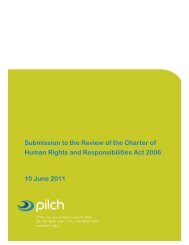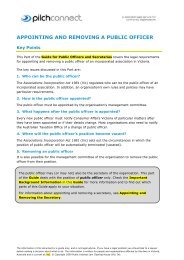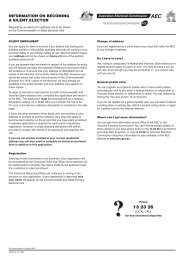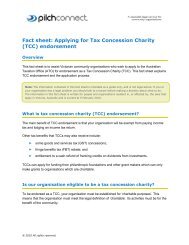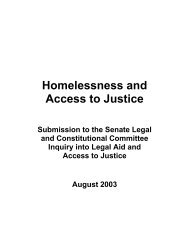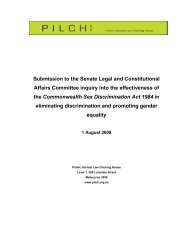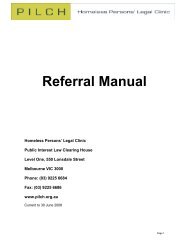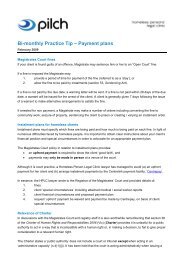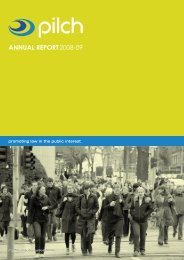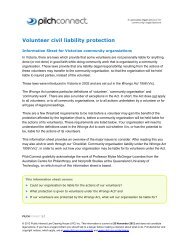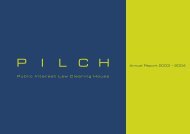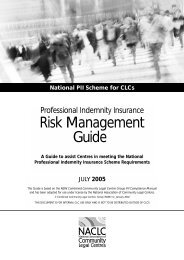Annual Report 2004 â 2005 - pilch
Annual Report 2004 â 2005 - pilch
Annual Report 2004 â 2005 - pilch
Create successful ePaper yourself
Turn your PDF publications into a flip-book with our unique Google optimized e-Paper software.
CASE SUMMARIES<br />
Trade Practices<br />
Herbert Geer & Rundle together with Jim Delany SC and Matthew Barrett of counsel<br />
accepted a referral to represent an animal liberation group in relation to Federal Court<br />
proceedings brought against it alleging that it engaged in conduct contrary to section<br />
45DB of the Trade Practices Act 1974 (Cth) (‘TPA’). The matter was referred to PILCH<br />
by Justice Gray of the Federal Court who considered that the group required expert<br />
legal representation, as the proceedings represent a test case regarding the application<br />
of section 45DB of the TPA (the ‘boycott’ provisions) to environmental protests. The<br />
same proceedings have been issued against an individual who requires separate<br />
representation. Maddocks, together with Charles Scerri QC and Matt Connock<br />
of counsel, accepted a referral to act for the individual on a pro bono basis.<br />
Taxation Law<br />
Arnold Bloch Leibler accepted a referral to assist a peak legal not-for-profit<br />
organisation, to prepare submissions for the Australian Taxation Office in relation to a<br />
recent draft ruling which deals with the definition of charitable status. The organisation<br />
is concerned that the proposed draft would severely restrict its constituents’ ability to<br />
engage in law reform and advocacy and to lobby for changes in government policy.<br />
Superannuation Law<br />
Sparke Helmore accepted a referral, and gave prompt advice, to a not-for-profit<br />
organisation regarding the operation of superannuation contributions to disabled and<br />
supported employees who receive less than 80% of full award wages. The organisation, a<br />
peak body concerned about the rights and needs of people with intellectual disabilities, had<br />
previously received conflicting advice about the requirements for the payment of super<br />
annuation contributions to supported employees under the Australian Liquor, Hospitality<br />
and Miscellaneous Workers Union Supported Employment (Business Enterprises ) Award<br />
2001 and the Superannuation Guarantee (Administration) Act 1992 (Cth).<br />
Defamation, Privacy and Duty of Care<br />
Ebsworth & Ebsworth accepted a referral to assist a not-for-profit organisation whose<br />
primary function is to provide training throughout Australia on issues arising out of<br />
child abuse and building child safe organisations. Specifically, the organisation sought<br />
advice as to the relevant laws regarding the duty of care owed by organisations with<br />
respect to child abuse and defamation and privacy issues regarding reference checks<br />
and screening of employees and volunteers. The organisation wanted expert advice so<br />
they could provide accurate information to participants at training sessions. Ebsworth<br />
& Ebsworth gave timely and thorough advice in the form of a short presentation to staff<br />
members regarding the current state of the law in the areas of privacy, defamation and<br />
negligence. The presentation and advice was well-received by staff members.<br />
We were so lucky to find PILCH.<br />
Their support and assistance<br />
provided us with an outstanding<br />
Tenancy Law<br />
legal team for our case.<br />
Not-for-profit organisation assisted<br />
by PILCH in <strong>2004</strong>-<strong>2005</strong><br />
In January <strong>2005</strong>, Alexandra Richards QC together with Samuel Hopper as junior<br />
counsel, were successful in the Supreme Court of Victoria in challenging the decision<br />
of the Victorian Civil and Administrative Tribunal (‘VCAT’), to evict an 80 year old war<br />
widow and public housing tenant.<br />
Counsel and the Tenants Union of Victoria, who acted on her behalf as instructing<br />
solicitors, argued that VCAT had erred in law. The client has lived in her Lakes Entrance<br />
public housing unit for almost ten years and was a good tenant. However, in October<br />
<strong>2004</strong>, while she was unwell and receiving medical treatment, her grandson, who was<br />
visiting but had never lived at the property, engaged in conversation with two housing<br />
support workers from the Office of Public Housing who were visiting the property. During<br />
that exchange, her grandson physically threatened the workers and told them to leave<br />
the premises. Following this event, the Director of Housing sought to evict her under<br />
section 244 of the Residential Tenancies Act 1997 (Vic) on the grounds of danger to<br />
occupiers of neighbouring premises. The Director sought an order from VCAT to enforce<br />
the notice to vacate. The Supreme Court found in the tenant’s favour, ruling that the<br />
order by VCAT to enforce the notice to vacate was unlawful. The case turned on the lack<br />
of jurisdiction that VCAT had to hear the matter given that the notice was defective, as<br />
it lacked particulars. This decision has become an important precedent and has been<br />
used successfully to the benefit of tenants in at least 10 cases, including for notices<br />
other than danger, by the Tenants Union of Victoria. The case also raised PILCH’s<br />
awareness of the need to increase the list of barristers able to respond to such matters<br />
at short notice, and as a result, PILCH, VB LAS and the Tenants Union of Victoria<br />
co-hosted a training seminar on this case and the applicable law.<br />
8



